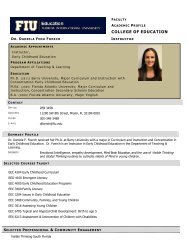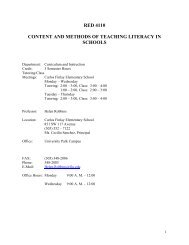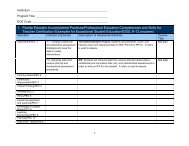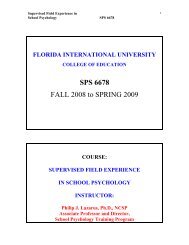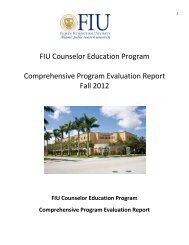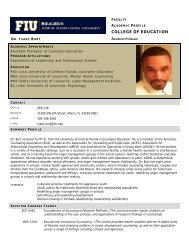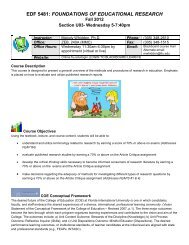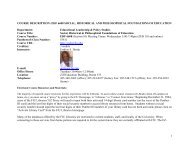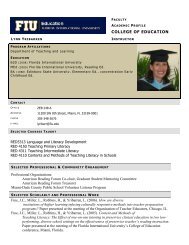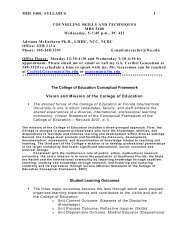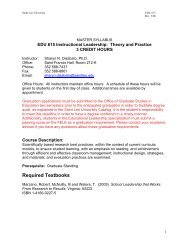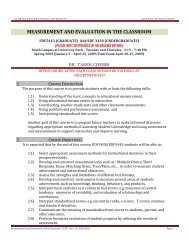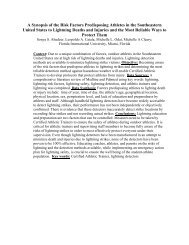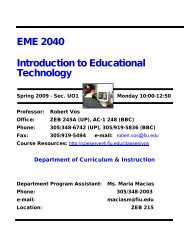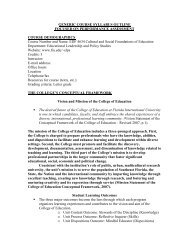counseling skills and techniques - College of Education - Florida ...
counseling skills and techniques - College of Education - Florida ...
counseling skills and techniques - College of Education - Florida ...
You also want an ePaper? Increase the reach of your titles
YUMPU automatically turns print PDFs into web optimized ePapers that Google loves.
COUNSELING SKILLS AND TECHNIQUES<br />
MHS 5400<br />
The <strong>College</strong> <strong>of</strong> <strong>Education</strong> Conceptual Framework<br />
Vision <strong>and</strong> Mission <strong>of</strong> the <strong>College</strong> <strong>of</strong> <strong>Education</strong><br />
• The desired future <strong>of</strong> the <strong>College</strong> <strong>of</strong> <strong>Education</strong> at <strong>Florida</strong> International<br />
University is one in which c<strong>and</strong>idates, faculty, <strong>and</strong> staff embrace the<br />
shared experiences <strong>of</strong> a diverse, international, pr<strong>of</strong>essional learning<br />
community. (Vision Statement <strong>of</strong> the Conceptual Framework <strong>of</strong> the<br />
<strong>College</strong> <strong>of</strong> <strong>Education</strong> – Revised 2007, p.1).<br />
The mission <strong>of</strong> the <strong>College</strong> <strong>of</strong> <strong>Education</strong> includes a three-pronged approach. First, the<br />
<strong>College</strong> is charged to prepare pr<strong>of</strong>essionals who have the knowledge, abilities, <strong>and</strong><br />
dispositions to facilitate <strong>and</strong> enhance learning <strong>and</strong> development within diverse settings.<br />
Second, the <strong>College</strong> must promote <strong>and</strong> facilitate the discovery, development,<br />
documentation, assessment, <strong>and</strong> dissemination <strong>of</strong> knowledge related to teaching <strong>and</strong><br />
learning. The third part <strong>of</strong> the <strong>College</strong>’s mission is to develop pr<strong>of</strong>essional partnerships<br />
in the larger community that foster significant educational, social, economic <strong>and</strong><br />
political change.<br />
Consistent with the institution’s role <strong>of</strong> public, urban, multicultural research<br />
university, the unit’s mission is to serve the population <strong>of</strong> Southeast <strong>Florida</strong>, the State,<br />
the Nation <strong>and</strong> the international community by imparting knowledge through excellent<br />
teaching, creating new knowledge through research, <strong>and</strong> fostering <strong>and</strong> nurturing<br />
creativity <strong>and</strong> its expression through service (Mission Statement <strong>of</strong> the <strong>College</strong> <strong>of</strong><br />
<strong>Education</strong> Conceptual Framework, 2007).<br />
Student Learning Outcomes<br />
• The three major outcomes become the lens through which each program<br />
organizes learning experiences <strong>and</strong> contributes to the vision <strong>and</strong> aim <strong>of</strong><br />
the <strong>College</strong> <strong>of</strong> <strong>Education</strong>.<br />
o Unit Content Outcome: Stewards <strong>of</strong> the Discipline<br />
(Knowledge)<br />
o Unit Process Outcome: Reflective Inquirer (Skills)<br />
o Unit Dispositions Outcome: Mindful Educator (Dispositions)<br />
Course Description: Skills <strong>and</strong> <strong>techniques</strong> in <strong>counseling</strong> focusing on<br />
competencies in relationship-building, interviewing, role-playing, simulation,<br />
<strong>and</strong> micro-<strong>counseling</strong>.
2<br />
Course Goals/Purpose: This is an experiential course that provides the<br />
opportunity for students to learn, experience, <strong>and</strong> practice the <strong>techniques</strong> <strong>and</strong><br />
<strong>skills</strong> used in a multicultural, developmental, intentional <strong>counseling</strong> approach.<br />
The emphasis is on conducting intentional <strong>counseling</strong> interviews/sessions <strong>and</strong> on<br />
the analysis <strong>and</strong> evaluation (self, peer, <strong>and</strong> instructor) <strong>of</strong> these. Students will<br />
also explore the nature <strong>of</strong> the <strong>counseling</strong> process, factors affecting client change<br />
<strong>and</strong> growth, <strong>counseling</strong> interventions, <strong>and</strong> personal <strong>and</strong> pr<strong>of</strong>essional issues<br />
related to <strong>counseling</strong>.<br />
Course Objectives<br />
1. To learn the history <strong>and</strong> philosophy <strong>of</strong> the <strong>counseling</strong> pr<strong>of</strong>ession, including<br />
significant factors <strong>and</strong> events (CACREP St<strong>and</strong>ard 1.a)<br />
2. To learn about the pr<strong>of</strong>essional roles, functions, <strong>and</strong> responsibilities <strong>of</strong> the<br />
pr<strong>of</strong>essional counselor <strong>and</strong> the relationships <strong>of</strong> counselors with other human<br />
service providers (CACREP St<strong>and</strong>ard 1.b)<br />
3. To learn about the <strong>counseling</strong> pr<strong>of</strong>essional organizations, primarily ACA, its<br />
divisions, branches, <strong>and</strong> affiliates, including membership benefits, activities,<br />
services to members, <strong>and</strong> current emphases (CACREP St<strong>and</strong>ard 1.f, SC A4)<br />
4. To become familiar with <strong>counseling</strong> pr<strong>of</strong>essional credentialing, including<br />
certification, licensure, <strong>and</strong> accreditation practices <strong>and</strong> st<strong>and</strong>ards, <strong>and</strong> the<br />
effects <strong>of</strong> public policy on these issues (CACREP St<strong>and</strong>ard 1.g)<br />
5. To learn about public <strong>and</strong> private policy processes, including the roles <strong>of</strong> the<br />
pr<strong>of</strong>essional counselor in advocating on behalf <strong>of</strong> the pr<strong>of</strong>ession (CACREP<br />
St<strong>and</strong>ard 1.h)<br />
6. To learn about advocacy <strong>and</strong> the processes needed to address institutional <strong>and</strong><br />
social barriers that impede access, equity, <strong>and</strong> success for clients (CACREP<br />
St<strong>and</strong>ard 1.i)<br />
7. To begin to become familiar with ACA’s ethical st<strong>and</strong>ards <strong>and</strong> related<br />
entities, <strong>and</strong> applications <strong>of</strong> ethical <strong>and</strong> legal considerations in pr<strong>of</strong>essional<br />
<strong>counseling</strong> (CACREP St<strong>and</strong>ard 1.j, MH B1)<br />
8. To learn <strong>and</strong> apply counselor characteristics <strong>and</strong> behaviors that influence the<br />
helping processes including age, gender, <strong>and</strong> ethnic differences, verbal <strong>and</strong><br />
nonverbal behaviors <strong>and</strong> personal characteristics, orientations, <strong>and</strong> <strong>skills</strong><br />
(CACREP St<strong>and</strong>ard 5.b)<br />
9. To help students gain an underst<strong>and</strong>ing <strong>and</strong> application <strong>of</strong> essential<br />
interviewing <strong>and</strong> <strong>counseling</strong> <strong>skills</strong> so that they are able to develop therapeutic<br />
relationships, establish appropriate <strong>counseling</strong> goals, design intervention<br />
strategies, evaluate client outcomes <strong>and</strong> successfully terminate the counselorclient<br />
relationship in a culturally responsive manner (CACREP St<strong>and</strong>ard 5.c,<br />
MH D5, <strong>and</strong> H2)<br />
10. To facilitate counselor self-awareness so that the counselor-client<br />
relationship is therapeutic <strong>and</strong> the counselor maintains appropriate pr<strong>of</strong>essional<br />
boundaries (CACREP St<strong>and</strong>ard 5.b)
3<br />
11. To provide an orientation to client <strong>and</strong> counselor wellness <strong>and</strong> self-care as<br />
desired <strong>counseling</strong> goals (CACREP St<strong>and</strong>ard 1d, 3h, 5a, MH D3)<br />
12. To expose students to various <strong>counseling</strong> theories <strong>and</strong> approaches thus<br />
enabling them to begin to develop their own natural styles <strong>and</strong> models <strong>of</strong><br />
helping others <strong>and</strong> specific interventions for clients (CACREP St<strong>and</strong>ard 5.d, SC<br />
C1)<br />
13. Students will be able to use technological strategies <strong>and</strong> applications within<br />
<strong>counseling</strong> processes by using video-taping <strong>and</strong> uploading artifacts onto their<br />
Efolio, Taskstream<br />
14. To provide opportunities for dialogue <strong>and</strong> reflection <strong>of</strong> personal values <strong>and</strong><br />
beliefs as they relate to students' future roles as pr<strong>of</strong>essional<br />
counselors/therapists <strong>and</strong> recognize one’s own limitations (CACREP St<strong>and</strong>ard<br />
5b, 5d, MH D9).<br />
15. Will become familiar with evidence-based treatments <strong>and</strong> basic strategies<br />
for evaluating <strong>counseling</strong> outcomes in clinical mental health <strong>counseling</strong><br />
(CACREP St<strong>and</strong>ard MH13).<br />
<strong>Florida</strong> Educators Accomplished Practices (FEAPS): Resulting from their<br />
participation in this course students will demonstrate FEAPS # 2<br />
Communication <strong>and</strong> #3 Continuous Improvement on their required task<br />
assignment (i.e., The Counseling Interview Self Assessment <strong>and</strong> Reflection<br />
Form Part B <strong>of</strong> the Final Videotape Counseling Interview) that will be<br />
uploaded onto the Student’s Taskstream Efolio when authorized by the<br />
Pr<strong>of</strong>essor. Students will be authorized to upload their artifact when they have<br />
attained a rating <strong>of</strong> Target or Acceptable on the assignment task.<br />
<strong>Florida</strong> Department <strong>of</strong> <strong>Education</strong> 15 th Edition Subject Area Competencies, <strong>and</strong> Skills<br />
Covered in this Course<br />
1 Knowledge <strong>of</strong> <strong>counseling</strong> (FEAP 8 Knowledge <strong>of</strong> Subject Matter, FEAP 11 Role <strong>of</strong> the<br />
Counselor)<br />
1. Demonstrate knowledge <strong>of</strong> major <strong>counseling</strong> theories. CACREP 5.d, SC C1<br />
2. Recognize the relationships <strong>of</strong> cultural identity, personality, learning, <strong>and</strong> human<br />
development theories to <strong>counseling</strong> theories. CACREP 2.c; 3.a, b<br />
3. Apply relevant <strong>counseling</strong> theories <strong>and</strong> <strong>techniques</strong> appropriate to specific situations <strong>and</strong><br />
populations. CACREP 2.c, 5.d,<br />
4. Recognize criteria for selecting appropriate modes <strong>of</strong> <strong>counseling</strong> interventions in individual,<br />
small group, <strong>and</strong> large group settings. CACREP 6c,d<br />
5. Demonstrate knowledge <strong>of</strong> interpersonal processes in small <strong>and</strong> large group settings.<br />
CACREP 6a<br />
6. Demonstrate knowledge <strong>of</strong> <strong>techniques</strong> <strong>and</strong> leadership <strong>skills</strong> for facilitating small <strong>and</strong> large<br />
groups. CACREP 6.b
4<br />
7. Demonstrate knowledge <strong>of</strong> appropriate listening <strong>and</strong> responding <strong>skills</strong> with all stakeholders.<br />
CACREP 5c,<br />
8. Identify appropriate evidence-based <strong>counseling</strong> approaches for specific populations. CACREP<br />
2. d, 5.d, SC D1; SCD2<br />
9. Demonstrate knowledge <strong>of</strong> human development <strong>and</strong> behavior to promote positive change.<br />
CACREP 3.c, 3.f. 3.h<br />
Methods <strong>of</strong> Delivery<br />
The purpose <strong>and</strong> goals <strong>of</strong> this course will be delivered using the following<br />
methods: Class lectures <strong>and</strong> discussions, assigned readings, role-playing, case<br />
analyzes, videotaping, audiovisual presentations, writing assignments <strong>and</strong><br />
papers, experiential activities, reading relevant research in the <strong>counseling</strong><br />
literature, <strong>and</strong> multiple-choice, short-answer <strong>and</strong> essay testing.<br />
Assessment <strong>of</strong> Student Learning Outcomes<br />
Students' achievement <strong>of</strong> fundamental knowledge, competencies, <strong>skills</strong>, <strong>and</strong><br />
dispositions will be assessed based on the completion <strong>of</strong> the following course<br />
requirements.<br />
1. Journal Readings/Synopses: Students will (a) access 5 journal articles in<br />
any <strong>of</strong> the American Counseling Association (ACA) journals (see<br />
www.<strong>counseling</strong>.org, for a list <strong>of</strong> ACA journals) <strong>and</strong> on-line <strong>counseling</strong> <strong>and</strong><br />
psychological journals on any <strong>of</strong> the topics below or a topic <strong>of</strong> interest to the<br />
student:<br />
Topics<br />
History <strong>and</strong> philosophy <strong>of</strong> the <strong>counseling</strong> pr<strong>of</strong>ession<br />
Counselor Vulnerability <strong>and</strong> Risk<br />
Hardships <strong>of</strong> Counseling Practice<br />
Therapy for Therapists<br />
Managing Stress<br />
Counselor Burnout <strong>and</strong> How to Avoid It<br />
Dealing with Difficult Clients<br />
Counselor Liability <strong>and</strong> How to Avoid Lawsuits<br />
Pr<strong>of</strong>essional Development <strong>and</strong> Counseling<br />
The Counselor as Client Advocate<br />
The Counselor as Community Change Agent<br />
Pr<strong>of</strong>essionalism <strong>and</strong> Counseling<br />
Client access to <strong>counseling</strong> with diverse populations<br />
Counselor <strong>and</strong> social justice<br />
Counselor Characteristics<br />
Counseling Specializations<br />
Legal <strong>and</strong> Ethical Issues
Counselor Reform<br />
Counseling theories <strong>and</strong> applications<br />
Counseling for health <strong>and</strong> wellness<br />
Counseling <strong>and</strong> spirituality<br />
5<br />
<strong>and</strong> (b) submit a one-page, double-spaced synopsis <strong>of</strong> the article in APA (6 th<br />
ed) style, <strong>and</strong> (c) a one page double-spaced reflection <strong>of</strong> how they can apply<br />
the material presented in the article to their future jobs as pr<strong>of</strong>essional<br />
counselors. Be sure to provide a reference <strong>of</strong> the article in APA style on the<br />
first page. Check the latest revision <strong>of</strong> the APA Manual or the APA Library<br />
Guidelines for APA writing style information. Points will be deducted for APA<br />
formatting errors. These sources must not be older than 10 years (i.e., 2002-<br />
present). Each journal synopsis is worth 2 points. This assignment is worth<br />
10% <strong>of</strong> the final grade.<br />
2. Counseling Interviews <strong>and</strong> Assessments: Students will partner with each<br />
other to complete these assignments. Each student will assume the role <strong>of</strong> the<br />
“counselor” <strong>and</strong> the “client” in the interviews. The assignment entails the<br />
following:<br />
a. Completion <strong>of</strong> two videotaped <strong>counseling</strong> interviews wherein the counselor<br />
demonstrates the facilitative, micro<strong>skills</strong> <strong>and</strong> the intentional interview approach<br />
to <strong>counseling</strong>.<br />
b. Completion <strong>of</strong> the Counseling Interview Self Assessment <strong>and</strong> Reflections<br />
that will include a double-space, typed transcription <strong>of</strong> 15 minutes <strong>of</strong> what<br />
the student would consider to be the “best” demonstration <strong>of</strong> the <strong>skills</strong> required<br />
in each interview. The transcription must contain verbatim the words spoken by<br />
both the client <strong>and</strong> the counselor with the facilitative, micro<strong>skills</strong> responses<br />
made by counselor identified. Students must also identify the focus <strong>of</strong> the<br />
responses each time it changes (e.g., focus on client, counselor, others,<br />
contextual information etc.). The first videotape <strong>and</strong> assessment is worth<br />
15% <strong>and</strong> the final one will be worth 25% for a total <strong>of</strong> 40% <strong>of</strong> the final<br />
grade.<br />
In the two (2) videotaped <strong>counseling</strong> interviews, students will be expected to<br />
demonstrate the intentional interviewing approach <strong>and</strong> the <strong>counseling</strong><br />
micro<strong>skills</strong>. The interviews must be spontaneous, non-rehearsed, <strong>and</strong> not<br />
scripted. They must be conducted with another class member. Students are<br />
responsible for purchasing <strong>and</strong> obtaining necessary materials <strong>and</strong> equipment.<br />
St<strong>and</strong>ard DVDs are recommended.<br />
The first videotaped interview should be 20-25 minutes in duration <strong>and</strong> in it,<br />
the counselor will demonstrate the use <strong>of</strong> the facilitative model <strong>of</strong>
6<br />
communication <strong>and</strong> the intentional <strong>counseling</strong> <strong>skills</strong> <strong>of</strong> the Basic Listening<br />
Sequence (e.g., attending behavior, open <strong>and</strong> closed questions, encouragers,<br />
paraphrases, <strong>and</strong> clarification statements, reflections <strong>of</strong> feeling <strong>and</strong> content, <strong>and</strong><br />
summarizations). The qualitative conditions <strong>of</strong> <strong>counseling</strong> should be evident<br />
throughout the interview, <strong>and</strong> the counselor should demonstrate cultural<br />
sensitivity <strong>and</strong> intentionality.<br />
The second videotaped interview should be 30-35 minutes in duration <strong>and</strong> in<br />
it, the counselor will demonstrate the facilitative model, the Basic Listening<br />
Sequence, the qualitative conditions <strong>of</strong> <strong>counseling</strong>, <strong>and</strong> the influencing <strong>skills</strong> as<br />
appropriate (e.g., feedback, disclosure, confrontation, reflection <strong>of</strong> meaning,<br />
logical consequences, directives). This final interview must have a briefsolution<br />
<strong>and</strong> action-oriented focus (i.e., guide the client to action based on the<br />
nature <strong>of</strong> the problem or decision that the client needs to make to bring about<br />
change in his/her life or situation).<br />
Informed Consent Form<br />
Students will develop a consent form that will be signed by the client studentpartner<br />
<strong>and</strong> submitted along with the typescript, self-assessment form, <strong>and</strong> the<br />
videotape. See Ivey et al. (2010) for a Sample Practice Contract on p. 38.<br />
Self-Assessment <strong>and</strong> Reflection <strong>of</strong> Counseling Interviews<br />
Students will complete a Self-assessment <strong>and</strong> Reflection <strong>of</strong> their <strong>counseling</strong><br />
interviews by using the "The Counseling Interview Self Assessment <strong>and</strong><br />
Reflection Forms (A & B)” (see attached). Students should be descriptive,<br />
thoughtful, <strong>and</strong> comprehensive in their assessments <strong>and</strong> reflections.<br />
The Pr<strong>of</strong>essor will review the tapes, self-assessments, <strong>and</strong> reflections <strong>and</strong><br />
provide feedback using these same forms as well as written comments on the<br />
<strong>skills</strong>, process, <strong>and</strong> nature <strong>of</strong> the client problem demonstrated. Students will be<br />
assessed based on the following rubric scale:<br />
The videotaped interviews <strong>and</strong> the self-assessment <strong>and</strong> reflections will be<br />
scored using the rubric below:<br />
St<strong>and</strong>ards Target Acceptable Unacceptable<br />
CACREP St<strong>and</strong>ard<br />
5.b, FEAPS 2,<br />
Communication<br />
Counseling<br />
becomes additive<br />
in their<br />
Considered by<br />
experts the<br />
minimal level for<br />
At first glance, the<br />
session appears to
To learn <strong>and</strong> apply<br />
counselor<br />
characteristics <strong>and</strong><br />
behaviors that<br />
influence the<br />
helping processes<br />
including age,<br />
gender, <strong>and</strong> ethnic<br />
differences, verbal<br />
<strong>and</strong> nonverbal<br />
behaviors <strong>and</strong><br />
personal<br />
characteristics,<br />
orientations, <strong>and</strong><br />
<strong>skills</strong><br />
CACREP St<strong>and</strong>ard<br />
5.c, MH D5, H2,<br />
FEAPS 2,<br />
Communication<br />
To help students<br />
gain an<br />
underst<strong>and</strong>ing <strong>and</strong><br />
application <strong>of</strong><br />
essential<br />
interviewing <strong>and</strong><br />
<strong>counseling</strong> <strong>skills</strong> so<br />
that they are able to<br />
develop therapeutic<br />
relationships,<br />
establish appropriate<br />
<strong>counseling</strong> goals,<br />
design intervention<br />
strategies, evaluate<br />
client outcomes, <strong>and</strong><br />
successfully<br />
terminate the<br />
counselor-client<br />
relationship in a<br />
culturally responsive<br />
manner<br />
communication<br />
in that the<br />
counselor is<br />
adding something<br />
beyond an<br />
interchangeable<br />
response.<br />
Attending <strong>and</strong><br />
influencing <strong>skills</strong><br />
are used in<br />
combination with<br />
the many<br />
qualities <strong>of</strong><br />
empathy<br />
(concreteness,<br />
immediacy,<br />
genuineness,<br />
positive regard)<br />
to provide a<br />
more effective<br />
<strong>and</strong> facilitative<br />
level <strong>of</strong><br />
<strong>counseling</strong>. The<br />
Counselor is<br />
communicating<br />
with<br />
intentionally <strong>and</strong><br />
sensitivity (i.e.,<br />
demonstrates a<br />
repertoire <strong>of</strong><br />
accurate<br />
paraphrase<br />
<strong>and</strong>/or reflection<br />
<strong>of</strong> feeling<br />
statements.<br />
Patterns <strong>of</strong><br />
movement<br />
synchrony <strong>and</strong><br />
movement<br />
complementarity<br />
<strong>of</strong>ten are<br />
manifested.<br />
The counselor<br />
adds a mild<br />
interpretation or<br />
<strong>counseling</strong> <strong>and</strong><br />
facilitative<br />
communication.<br />
Responses are<br />
interchangeable<br />
with what the<br />
client is saying.<br />
An<br />
interchangeable<br />
response is best<br />
exemplified by<br />
an accurate<br />
reflection <strong>of</strong><br />
feeling,<br />
paraphrase, or<br />
summary that<br />
catches the<br />
essence <strong>of</strong> what<br />
the client has<br />
said. Open <strong>and</strong><br />
closed questions<br />
are used to<br />
obtain<br />
information <strong>and</strong><br />
the client’s<br />
perspective on<br />
the issue or<br />
problem being<br />
addressed. A<br />
self-disclosure or<br />
feedback<br />
responses that<br />
aid client<br />
responding are<br />
other examples<br />
<strong>of</strong> acceptable<br />
competency<br />
7<br />
be moving<br />
normally.<br />
However, on<br />
deeper analysis,<br />
one sees that the<br />
counselor/therapist<br />
is detracting<br />
slightly from what<br />
the client has been<br />
communicating.<br />
The paraphrase is<br />
close, but still<br />
misses the client's<br />
meaning. Much <strong>of</strong><br />
our daily<br />
conversation fits<br />
this pattern. As a<br />
result <strong>of</strong> the<br />
interaction, the<br />
client is not<br />
damaged <strong>and</strong> has<br />
been listened to<br />
minimally, but<br />
counselor<br />
responses take<br />
away from what<br />
the client says or<br />
minimizes<br />
statements.<br />
The<br />
counselor/therapist<br />
may be implicitly<br />
<strong>and</strong> subtly<br />
destructive, even<br />
though overtly<br />
trying to be<br />
helpful. At its<br />
worst point, the<br />
counselor/therapist<br />
is overtly<br />
destructive to the<br />
interviewing<br />
process. He/she<br />
fails to attend<br />
(sharp body shifts,
a probing<br />
question or<br />
interpretation<br />
that not only<br />
catches the major<br />
meanings <strong>of</strong> the<br />
client but also<br />
adds something<br />
new to facilitate<br />
growth <strong>and</strong><br />
exploration.<br />
8<br />
major topic jumps)<br />
in a way that<br />
sharply disrupts<br />
client flow or<br />
attacks the client<br />
or discounts<br />
information<br />
CACREP St<strong>and</strong>ard<br />
5.b d, FEAPS 3,<br />
Continuous<br />
Improvement<br />
To facilitate<br />
counselor selfawareness<br />
so that<br />
the counselor-client<br />
relationship is<br />
therapeutic <strong>and</strong> the<br />
counselor maintains<br />
appropriate<br />
pr<strong>of</strong>essional<br />
boundaries<br />
To provide<br />
opportunities for<br />
dialogue <strong>and</strong><br />
reflection <strong>of</strong><br />
personal values <strong>and</strong><br />
beliefs as they relate<br />
to students' future<br />
roles as pr<strong>of</strong>essional<br />
counselors/therapists<br />
The Counselor is<br />
able to reflect in<br />
depth on their<br />
individual<br />
<strong>counseling</strong> style,<br />
<strong>counseling</strong><br />
problem <strong>and</strong><br />
process, <strong>and</strong> the<br />
<strong>skills</strong> <strong>and</strong><br />
interventions<br />
used to bring<br />
about client<br />
change <strong>and</strong><br />
action. The<br />
Counselor is able<br />
to assess their<br />
<strong>counseling</strong> style<br />
<strong>and</strong> performance<br />
with depth,<br />
clarity, <strong>and</strong><br />
accuracy <strong>and</strong><br />
make<br />
recommendations<br />
for improvements<br />
in future<br />
<strong>counseling</strong><br />
sessions <strong>and</strong><br />
interviews. The<br />
Counselor can<br />
cite several<br />
examples <strong>of</strong><br />
responses made<br />
The Counselor is<br />
able to<br />
adequately<br />
reflect on their<br />
individual<br />
<strong>counseling</strong> style,<br />
the <strong>counseling</strong><br />
problem <strong>and</strong><br />
process, <strong>and</strong> the<br />
<strong>skills</strong> <strong>and</strong><br />
interventions<br />
used to bring<br />
about client<br />
change <strong>and</strong><br />
action. The<br />
Counselor is able<br />
to assess their<br />
<strong>counseling</strong> style<br />
<strong>and</strong> performance<br />
with clarity,<br />
thoughtfulness,<br />
<strong>and</strong> accuracy <strong>and</strong><br />
make<br />
recommendations<br />
for improvements<br />
in future<br />
<strong>counseling</strong><br />
sessions <strong>and</strong><br />
interviews. The<br />
counselor can<br />
cite one or two<br />
examples <strong>of</strong><br />
The Counselor<br />
failed to<br />
adequately<br />
communicate their<br />
reflections <strong>and</strong><br />
reactions to their<br />
individual<br />
<strong>counseling</strong> style,<br />
the <strong>counseling</strong><br />
problem <strong>and</strong><br />
process, <strong>and</strong> the<br />
<strong>skills</strong> <strong>and</strong><br />
interventions used<br />
to bring about<br />
client change. The<br />
Counselor failed<br />
to adequately<br />
assess their<br />
<strong>counseling</strong> style<br />
<strong>and</strong> performance<br />
with clarity,<br />
thoughtfulness,<br />
<strong>and</strong> accuracy <strong>and</strong><br />
make<br />
recommendations<br />
for improvements<br />
in future<br />
<strong>counseling</strong><br />
sessions <strong>and</strong><br />
interviews. The<br />
counselor cited no<br />
examples <strong>of</strong>
FEAPS 6 Ethics, 12<br />
Technology<br />
Students will be able<br />
to use technological<br />
strategies <strong>and</strong><br />
applications within<br />
<strong>counseling</strong> processes<br />
by using videotaping<br />
<strong>and</strong> uploading<br />
artifacts onto their<br />
Efolio, Taskstream<br />
in the interview<br />
that need<br />
improvement <strong>and</strong><br />
suggest<br />
alternative<br />
responses that<br />
would have been<br />
more helpful <strong>and</strong><br />
facilitative to the<br />
client. The<br />
Counselor is able<br />
to reflect on the<br />
impact <strong>of</strong> the<br />
knowledge,<br />
<strong>skills</strong>, <strong>and</strong><br />
dispositions<br />
learned in this<br />
assignment on<br />
their future work<br />
as counselors <strong>and</strong><br />
on ways these<br />
can be applied in<br />
their work with<br />
future clients<br />
Both the client<br />
<strong>and</strong> counselor<br />
can be seen<br />
<strong>and</strong>/or heard on<br />
the tape <strong>and</strong> the<br />
assignment has<br />
been successfully<br />
uploaded onto<br />
Taskstream.<br />
responses made<br />
in the interview<br />
that need<br />
improvement <strong>and</strong><br />
suggest<br />
alternative<br />
responses that<br />
would have been<br />
more helpful <strong>and</strong><br />
facilitative to the<br />
client.<br />
For the majority<br />
<strong>of</strong> the session,<br />
both the client<br />
<strong>and</strong> counselor<br />
can be seen/<strong>and</strong><br />
or heard on the<br />
tape but there are<br />
times when both<br />
are not visible<br />
<strong>and</strong>/or audio<br />
quality is<br />
obscured.<br />
9<br />
responses made in<br />
the interview that<br />
needed<br />
improvement<br />
<strong>and</strong>/or failed to<br />
suggest alternative<br />
responses that<br />
would have been<br />
more helpful <strong>and</strong><br />
facilitative to the<br />
client.<br />
Neither the client<br />
or counselor could<br />
be seen on the<br />
videotape; audio<br />
quality is poor or<br />
totally lacking<br />
Assignment was<br />
not uploaded onto<br />
Taskstream<br />
correctly.<br />
FEAP 6 Ethics<br />
CACREP St<strong>and</strong>ard<br />
1.g, MH B1<br />
The counselor<br />
sought the<br />
client’s<br />
permission to<br />
videotape; legal<br />
The assignment<br />
was uploaded<br />
onto Taskstream.<br />
The counselor<br />
sought the<br />
client’s<br />
permission to<br />
videotape; legal<br />
The counselor did<br />
not seek the<br />
client’s permission<br />
to videotape; legal<br />
<strong>and</strong> ethical issues
To begin to become<br />
familiar with ACA’s<br />
ethical st<strong>and</strong>ards <strong>and</strong><br />
related entities, <strong>and</strong><br />
applications <strong>of</strong><br />
ethical <strong>and</strong> legal<br />
considerations in<br />
pr<strong>of</strong>essional<br />
<strong>counseling</strong><br />
<strong>and</strong> ethical<br />
issues were<br />
completely<br />
discussed at the<br />
beginning <strong>of</strong> the<br />
<strong>counseling</strong><br />
session <strong>and</strong><br />
client<br />
comprehension<br />
<strong>of</strong> such was<br />
assessed; legal<br />
<strong>and</strong> ethical<br />
st<strong>and</strong>ards were<br />
adhered<br />
throughout the<br />
session.<br />
<strong>and</strong> ethical<br />
issues were<br />
adequately<br />
discussed at the<br />
beginning <strong>of</strong> the<br />
<strong>counseling</strong><br />
session <strong>and</strong><br />
client<br />
comprehension<br />
<strong>of</strong> such was<br />
assessed; legal<br />
<strong>and</strong> ethical<br />
st<strong>and</strong>ards were<br />
adhered<br />
throughout the<br />
session.<br />
10<br />
were not discussed<br />
at the beginning <strong>of</strong><br />
the <strong>counseling</strong><br />
session <strong>and</strong> client<br />
comprehension <strong>of</strong><br />
such was not<br />
assessed; legal <strong>and</strong><br />
ethical st<strong>and</strong>ards<br />
were minimally<br />
adhered<br />
throughout the<br />
session.<br />
Skills <strong>and</strong> Self Assessment<br />
(3) Target<br />
(2) Acceptable<br />
(1) Unacceptable<br />
Students whose interviews are rated as Not acceptable must request a ½ hour<br />
conference with the Pr<strong>of</strong>essor to review the videotape <strong>and</strong> the <strong>skills</strong><br />
demonstrated. The student may resubmit another videotaped interview for<br />
further feedback from the Pr<strong>of</strong>essor.<br />
Students who obtain Target <strong>and</strong> Acceptable will receive the total number <strong>of</strong><br />
points (15 for the first interview, <strong>and</strong> 25 for the second interview) for the<br />
assignment if all parts <strong>of</strong> the assignment have been completed accurately. Points<br />
may be deducted for incomplete assignments. Students with assignments that are<br />
Not Acceptable will be deducted a minimum <strong>of</strong> 5 points <strong>and</strong> will be able to earn<br />
only a maximum <strong>of</strong> 10 or 20 points upon reaching acceptable competency.<br />
Students will have one opportunity to redo the assignment <strong>and</strong> to reach<br />
acceptable competency.<br />
Uploading the Efolio Artifact<br />
When students complete the Efolio, Taskstream, task assignment that has<br />
been graded by the Pr<strong>of</strong>essor, they will receive authorization to upload the<br />
task as an artifact onto their Efolio. Students will be authorized to upload<br />
their artifact when they have achieved Target or Acceptable Competency on<br />
the task.
11<br />
The artifact that students will upload onto their Efolios will be the Final<br />
Tape Self Assessment <strong>and</strong> Reflection Form Part B (FEAPS Artifact).<br />
Students whose tasks are deemed Not Acceptable by the Pr<strong>of</strong>essor will not<br />
be authorized to upload <strong>and</strong> will receive an “Unsatisfactory” grade for the<br />
course if they fail to complete the task to acceptable competency by the end<br />
<strong>of</strong> the semester. Students who fail to upload target <strong>and</strong> acceptable<br />
assignments will also receive an “Unsatisfactory” grade in the course.<br />
Confidentiality <strong>and</strong> Ethics Information<br />
Students are bound by the ACA 2005 Code <strong>of</strong> ethical st<strong>and</strong>ards to abide by<br />
confidentiality with respect to any material or issues brought forth by any<br />
members <strong>of</strong> the class during any role-playing or practice interview sessions<br />
conducted throughout any portions <strong>of</strong> this class. Students should seek verbal as<br />
well as written permission <strong>of</strong> the student client before conducting the<br />
videotaped interviews.<br />
Students have the right <strong>and</strong> personal responsibility to only share or disclose<br />
issues <strong>and</strong> information with which they feel comfortable. If at any time during<br />
the interview a student feels discomfort or is unable to continue, he or she can<br />
request the right to stop the videotape or not engage in the role-played session.<br />
However, if a student finds him or her self very uncomfortable with the nature<br />
<strong>and</strong> activities required by this course as well as the <strong>counseling</strong> practice <strong>and</strong><br />
issues one must face, he or she may prefer to drop this course. When selecting a<br />
partner with whom to conduct the interviews, it is best to choose someone you<br />
do not know.<br />
3. Progress Tests: Completion <strong>of</strong> 2 Progress Tests that will consist <strong>of</strong> multiple<br />
choice, short answer <strong>and</strong> essay questions. Each exam is worth 25% <strong>of</strong> the final<br />
grade for a total <strong>of</strong> 50% <strong>of</strong> the final grade.<br />
4. Experiential Class Activities <strong>and</strong> Attendance:<br />
Practice Sessions – A substantial portion <strong>of</strong> many classes will be devoted to<br />
simulated or “practice” <strong>counseling</strong> sessions in which students will rotate among<br />
the following three roles: counselor, client, <strong>and</strong> observer. These sessions may be<br />
audio-taped <strong>and</strong>/or observed by the pr<strong>of</strong>essor. Some <strong>of</strong> the ideal characteristics<br />
<strong>of</strong> each role include:<br />
• Counselor: This role calls for practice <strong>and</strong> demonstration <strong>of</strong> <strong>skills</strong><br />
learned in assigned readings <strong>and</strong> class discussions. A student in this role<br />
should exhibit genuineness, openness, empathy <strong>and</strong> congruence;<br />
engagement with the process, person <strong>and</strong> task; willingness to take risks in<br />
the spirit <strong>of</strong> learning; <strong>and</strong> acceptance <strong>of</strong> positive feedback <strong>and</strong><br />
constructive criticism.
12<br />
• Client: A student in this role should exhibit genuineness, openness <strong>and</strong> a<br />
present orientation. In the role <strong>of</strong> client, students are asked to draw upon<br />
real life experiences, the content <strong>of</strong> which is totally within the student’s<br />
discretion. Students should take responsibility for determining <strong>and</strong><br />
monitoring the level <strong>of</strong> self-disclosure that they contribute to the learning<br />
experience. Students may also choose to role play the part <strong>of</strong> “client”,<br />
with the underst<strong>and</strong>ing that such simulation may detract from the realism<br />
<strong>and</strong> quality <strong>of</strong> the learning experience. Also in this role, students will be<br />
expected to provide feedback to the individual in the ”counselor” role.<br />
• Observer: This role calls for close attention to the process occurring<br />
between the counselor <strong>and</strong> the client <strong>and</strong> an ability to relate what occurs<br />
in the practice session to the learned material. It also calls for a<br />
development <strong>of</strong> the ability to give constructive feedback. The person in<br />
this role will take notes <strong>and</strong> complete an observation form to be used as<br />
feedback for the Counselor.<br />
• Students are expected to attend class <strong>and</strong> participate in these practice<br />
activities. Excused absences must be valid <strong>and</strong> approved by the Pr<strong>of</strong>essor<br />
prior to the absence. In the case <strong>of</strong> an emergency absence, the student<br />
should notify the Pr<strong>of</strong>essor as soon as possible following the absence.<br />
The Pr<strong>of</strong>essor reserves the right to ask for written documentation <strong>of</strong> the<br />
reason for the absence.<br />
St<strong>and</strong>ards <strong>of</strong> Academic Conduct<br />
Graduate <strong>counseling</strong> students should observe high st<strong>and</strong>ards <strong>of</strong> academic<br />
conduct, ethics, <strong>and</strong> integrity as stated in the Student H<strong>and</strong>book. No student<br />
shall engage in any form <strong>of</strong> fraudulent, deceitful, dishonest, or unfair conduct<br />
with respect to examinations, papers, presentations, or other academic endeavor.<br />
The consequences <strong>of</strong> this conduct will result in academic sanctions<br />
against the student in violation. Any questions or issues concerning the honor<br />
code should be brought to the pr<strong>of</strong>essor’s attention immediately. Please review<br />
the Student H<strong>and</strong>book for the full Code <strong>of</strong> Academic Integrity <strong>and</strong>/or refer to<br />
the website http://www.fiu.edu/~dwyere/academicintegrity.html<br />
Code <strong>of</strong> Decorum<br />
The Department <strong>of</strong> <strong>Education</strong>al <strong>and</strong> Psychological Studies has developed a<br />
Pr<strong>of</strong>essional Code <strong>of</strong> Decorum. It can be found on the department's web site,<br />
http://www.fiu.edu/~edpsy/code.htm. All students taking courses in this<br />
department are expected to meet the expectations outlined in this Code.
Course Policies<br />
13<br />
Attendance: It is expected that all students will be in attendance for all<br />
class sessions. This is a class that requires active in-class participation from<br />
each member. If you miss a class YOU are responsible for any material given or<br />
changes made during the class period <strong>and</strong> you must notify me via e-mail <strong>of</strong> your<br />
absence prior to your absence.<br />
Free discussion, inquiry, <strong>and</strong> expression are encouraged in this class.<br />
Classroom behavior that interferes with either (a) the instructor’s ability to<br />
conduct the class, or (b) the ability <strong>of</strong> students to benefit from the instruction, is<br />
not acceptable. Examples may include entering class late or departing early; use<br />
<strong>of</strong> cellular telephones, or other electronic devices (Please refrain from sending<br />
<strong>and</strong>/or receiving text messages during class); repeatedly talking in class without<br />
being recognized; talking while others are speaking; or arguing in a way that is<br />
perceived as “crossing the civility line.” Please turn <strong>of</strong>f all cellular telephone<br />
prior to entering class <strong>and</strong> refrain from using laptops for non-class related tasks<br />
during class (“surfing” the web, checking email, etc...).<br />
Make-Up Exam/Assignment Due Date Policy Example: Opportunities for<br />
make-up exams <strong>and</strong>/or assignments are limited to documented medical<br />
emergencies or personal emergencies pre-approved by the pr<strong>of</strong>essor. Late is<br />
defined as the end <strong>of</strong> the class session in which the assignment is due.<br />
E-mail Protocol: Please adhere to the following guidelines:<br />
Write the course prefix ONLY (MHS 5400) in the subject line <strong>of</strong> all e-mail<br />
correspondence <strong>and</strong> insert your name in the e-mail. Please allow 24-48 hours for<br />
a reply.
Final Grades<br />
14<br />
Grades will be assigned based on the following distribution:<br />
100 - 95 = A (4.00 grade points) Excellent; superior<br />
94 - 90 = A- (3.67 grade points) Very Good<br />
89 - 85 = B+ (3.33 grade points) With merit; good<br />
84 - 80 = B (3.00 grade points) Good<br />
79 - 75 = B- (2.67 grade points) Above-satisfactory<br />
74 - 70 = C+ (2.33 grade points) Above-satisfactory<br />
69 - 65 = C (2.00 grade points) Satisfactory; minimum<br />
64 - 60 = C- (1.67 grade points) Graduate competency<br />
59 - 55 = D+ (1.33 grade points) Unsatisfactory<br />
54 - 50 = D (1.00 grade points) Unsatisfactory<br />
49 - 45 = D- (.67 grade points) Unsatisfactory<br />
44 Below = F (0.00 grade points) Failure<br />
Required Textbooks<br />
Ivey, A. E., Ivey, M. B. & Zalaquett, C. P. (2010). Intentional interviewing <strong>and</strong><br />
<strong>counseling</strong>: Facilitating client development in a multicultural society (7 th<br />
ed.). Pacific Grove, CA: Brooks/Cole.<br />
Kottler, J. A. (2010). On being a therapist (4th ed.). San Francisco, CA:<br />
Jossey-Bass.<br />
Recommended Textbooks <strong>and</strong> Materials<br />
Corey, G. (2005). Theory <strong>and</strong> practice <strong>of</strong> <strong>counseling</strong> <strong>and</strong> psychotherapy (7 th<br />
ed.).Belmont: CA: Brooks/Cole.<br />
Sklare, G. B. (2005). Brief <strong>counseling</strong> that works: A solution-focused approach<br />
for counselors <strong>and</strong> administrators (2 nd ed.). Thous<strong>and</strong> Oaks: CA: Corwin<br />
Press.<br />
American Counseling Association (ACA) (2005). Code <strong>of</strong> ethics <strong>and</strong><br />
st<strong>and</strong>ards <strong>of</strong> practice. Alex<strong>and</strong>ria, VA: ACA.<br />
National Rehabilitation Counseling Association (NRCA) (2009).<br />
Code <strong>of</strong> Pr<strong>of</strong>essional Ethics for Rehabilitation Counselors. Rowling<br />
Meadows: IL.<br />
American School Counseling Association (ASCA) (2010). Ethical<br />
st<strong>and</strong>ards for school counselors. Alex<strong>and</strong>ria, VA: ASCA.
15<br />
ASSIGNMENT & EXAMINATION DUE DATES<br />
• Journal Sypnosis: Due 9/5, 9/19, 10/24, 11/7, 11/21<br />
• Counseling Interview I: Tape, Typescript, Consent, & Assessment &<br />
Reflections: Due 10/10<br />
• Counseling Interview II: Tape, Typescript, Consent & Assessment &<br />
Reflections: Due 11/14<br />
• Progress Tests: 10/3 <strong>and</strong> 11/21<br />
Late Penalty: Half a grade may be deducted for each week an assignment is<br />
submitted past the due date. Assignments that are not typed will not be<br />
accepted.<br />
** Students with physical or other impairments that necessitate special circumstances or<br />
devices in the classroom or when taking examinations, should consult with the Pr<strong>of</strong>essor<br />
regarding their special needs <strong>and</strong> accommodations. The Office <strong>of</strong> Disability Services for<br />
Students <strong>of</strong>fers a variety <strong>of</strong> services to assist students needing such accommodations. For<br />
assistance, contact GC 225, UP (348-3532) or UC 260, NM (940-5813).
16<br />
Course Schedule <strong>and</strong> Reading Assignments<br />
8/22 Course Introduction <strong>and</strong> Getting Acquainted<br />
Review <strong>of</strong> Syllabus; What is Counseling How Did Counseling<br />
Evolve, History <strong>and</strong> Philosophy; Role <strong>of</strong> the Pr<strong>of</strong>essional;<br />
Introduction to the Micro<strong>skills</strong> Approach (CACREP St<strong>and</strong>ard 1.a,<br />
1.b, 1.h, 5c) Ivey, Chap. 1; Kottler, Chap. 1<br />
8/29 Being a Pr<strong>of</strong>essional Counselor (ACA <strong>and</strong> divisions, licensure,<br />
accreditation, <strong>and</strong> certification) Introduction to Legal <strong>and</strong> Ethical<br />
Issues, Multicultural Competence <strong>and</strong> Wellness<br />
Ivey, Chap. 2; Kottler Chap 2 (CACREP St<strong>and</strong>ard 1.b, 1.c, 1.f, 1.g,<br />
1.j, 2.a, 2.e, 3.h, 5.a)<br />
9/5 Attending Behavior & Skills; Multicultural Issues in Attending<br />
Questions: Opening Communication; Multicultural Issues in<br />
Questioning; Ivey, Chap 3 & 4; Kottler: Chap.3<br />
(CACREP St<strong>and</strong>ard 2.a, 2.c, 5.c)<br />
Journal Synopsis Due<br />
9/12 Client Observation Skills; Ivey: Chap 5<br />
Encouraging, Paraphrasing <strong>and</strong> Summarizing: Ivey, Chap 6<br />
(CACREP St<strong>and</strong>ard 5.a, 5.b, 5.c)<br />
Ethical Use <strong>of</strong> Technology <strong>and</strong> Instructions for Taping <strong>and</strong><br />
Taskstream Uploading (CACREP 1.j, 7.g)<br />
9/19 Reflection <strong>of</strong> Feeling, Ivey Chap. 7 & Kottler Chap. 4<br />
(CACREP St<strong>and</strong>ard 5.a, 5.b, 5.c)<br />
Journal Synopsis Due<br />
9/26 Empathy <strong>and</strong> Reflection <strong>of</strong> Feeling continued;<br />
Conducting an intake interview using the Basic Listening Sequence<br />
Ivey: Chap.7 & 8; Kottler, Chap.5; (CACREP St<strong>and</strong>ard 5.a, 5.b, 5.c,<br />
MH H2)<br />
10/3 Progress Test I (Ivey, Chapters 1 – 6;<br />
Kottler, Chapters 1 – 4)<br />
10/10 The Influencing Skills/Confrontation/Focusing the Interview <strong>and</strong><br />
Narrative Ivey, Chap.9. 10; Kottler, Chap.6 & 7; (CACREP<br />
St<strong>and</strong>ard 5.a, 5.b, 5.c,)<br />
Counseling Interview I: Tape, Consent, Typescript, Self-<br />
Assessment <strong>and</strong> Reflections Due
MHS 5400: SYLLABUS 17<br />
10/17 No Class<br />
10/24 The Influencing Skills <strong>of</strong> Reflection <strong>of</strong> Meaning, Positive<br />
Reframing Self-Disclosure, Interpretation,<br />
Feedback & Directives, Ivey, Chap. 11; Kottler, Chap. 8<br />
(CACREP St<strong>and</strong>ard 5.a, 5.b, 5.c)<br />
Journal Synopsis Due<br />
10/31 The Influencing Skills Continued; A Brief Introduction to<br />
Counseling Theories—Person-Centered, Behavioral, Cognitive,<br />
Brief Solution Focused Counseling; Ivey, Chap. 12; Kottler, Chap.<br />
9 (CACREP St<strong>and</strong>ard 5.a, 5.b, 5.c, 5.d)<br />
11/7 Counselor Advocacy: For clients <strong>and</strong> the pr<strong>of</strong>ession; Client access<br />
<strong>and</strong> equity (CACREP St<strong>and</strong>ard 1.h, 2.e)<br />
Ivey: Chap. 13<br />
Journal Synopsis Due<br />
11/14 Theories continued with Skill Integration; Conducting an Interview<br />
Using the Listening <strong>and</strong> Influencing Skills<br />
Ivey: Chap. 14; (CACREP St<strong>and</strong>ard 5.a, 5.b, 5.c, MH H2)<br />
Counseling Interview II: Tape, Consent, Typescript, & Self<br />
Assessment <strong>and</strong> Reflections Due<br />
11/21 Progress Test II<br />
Developing an Individual Counseling Style;<br />
Teaching the Micro<strong>skills</strong> (CACREP St<strong>and</strong>ard 5.a, 5.b, 5.c)<br />
Journal Synopsis Due<br />
11/28 Catching <strong>and</strong> Wrapping it up! Review <strong>of</strong> Videotapes <strong>and</strong> Final<br />
Reflections<br />
NOTE: Students with Target <strong>and</strong> Acceptable Artifacts must<br />
complete all uploading <strong>of</strong> artifacts onto Efolio. Last date to<br />
upload authorized artifacts is December 3, 2012.
MHS 5400<br />
MHS 5400<br />
COUNSELING INTERVIEW<br />
SELF ASSESSMENT AND REFLECTION FORM<br />
PART A<br />
Student’s Name:_____________________________________________<br />
Session #:___________<br />
Date:_________<br />
Directions: Please place a “1" (Evident), “0" (Not Evident), or “NA” before each<br />
evaluative item. “1" indicates the behavior or skill is evident; “0" indicates that it is not<br />
evident. “NA” indicates the behavior or skill was not applicable or the rater is not able to<br />
evaluate the item.<br />
____1.<br />
____2.<br />
____3.<br />
____4.<br />
____5.<br />
____6.<br />
____7.<br />
____8.<br />
____9.<br />
____10.<br />
____11.<br />
____12.<br />
____13.<br />
____14.<br />
____15.<br />
The client chosen for this <strong>counseling</strong> interview is currently enrolled in the<br />
<strong>counseling</strong> course.<br />
The counselor secured the client’s permission to tape the <strong>counseling</strong><br />
interview.<br />
Both the client <strong>and</strong> counselor can be seen <strong>and</strong>/or heard on the tape.<br />
The <strong>counseling</strong> interview lasted the required amount <strong>of</strong> time.<br />
The counselor sounded genuinely interested <strong>and</strong> concerned in the client’s<br />
issues/concerns/problems.<br />
The counselor appeared to be able to establish rapport effectively with the<br />
client.<br />
The counselor appeared to be relatively relaxed <strong>and</strong> natural as the <strong>counseling</strong><br />
interview progressed.<br />
The client appeared to be relatively relaxed with the counselor as the<br />
<strong>counseling</strong> interview progressed.<br />
The counselor appeared to maintain a composed, steady, demeanor during the<br />
<strong>counseling</strong> interview.<br />
The client appeared comfortable to express thoughts <strong>and</strong> feelings with the<br />
counselor.<br />
The counselor kept the <strong>counseling</strong> interview flowing <strong>and</strong> moving effectively.<br />
The counselor kept effective focus on the client’s issues <strong>and</strong> concerns.<br />
Appropriate attending behavior (eye contact, forward body position, etc.) was<br />
demonstrated by the counselor.<br />
The counselor attempted to move the client toward active behavior.<br />
It appeared that the counselor was able to conduct a <strong>counseling</strong> session that<br />
was <strong>of</strong> benefit to the client.<br />
18
MHS 5400<br />
MHS 5400<br />
COUNSELING INTERVIEW<br />
SELF ASSESSMENT AND REFLECTIONS FORM<br />
PART B<br />
Name: ____________________________Session Date: ________________________<br />
Client’s Initials: _____________<br />
Session Length: _____________<br />
Session Number with Client: __________<br />
1. Background Information (client description, demographics, presenting issue or concern):<br />
2. Session Notes (What was your goal for the session How were you attempting to<br />
accomplish this goal What happened in the session Any behavioral observations):<br />
3. Communication Micro<strong>skills</strong> (What micro<strong>skills</strong> were predominantly used in this session<br />
Were these appropriate to the timing <strong>and</strong> issues being discussed<br />
4. Conceptualization (Counselor's interpretation <strong>of</strong> what was happening with the client,<br />
hypotheses concerning possible treatment approaches):<br />
19
MHS 5400<br />
Assessment Form, B 2<br />
5. Counselor's reaction to session (YOUR thoughts <strong>and</strong> feelings about what happened in<br />
the session, what went well (or didn’t go well) in the session, <strong>and</strong> why):<br />
6. What counselor would have done differently <strong>and</strong> why: (What are some different<br />
<strong>counseling</strong> <strong>skills</strong>, responses, <strong>and</strong> interventions that you might have used instead <strong>and</strong> why.<br />
7. How does this assignment relate to your future work as a counselor In other words,<br />
how (cite examples) will you be able to use <strong>and</strong> apply the knowledge, <strong>skills</strong>, <strong>and</strong><br />
dispositions learned in this assignment in your future work as a counselor (school,<br />
mental health, or rehabilitation)<br />
8. Rate your overall performance in this session based on the criteria delineated in the<br />
attached scoring rubric:<br />
On Target_______<br />
Acceptable__________<br />
Not Acceptable, needs considerable improvement___________<br />
20
MHS 5400<br />
Why did you choose to rate your performance at this level<br />
8. What additional supervision <strong>and</strong> feedback do you feel you need from the Pr<strong>of</strong>essor on<br />
this assignment<br />
21



